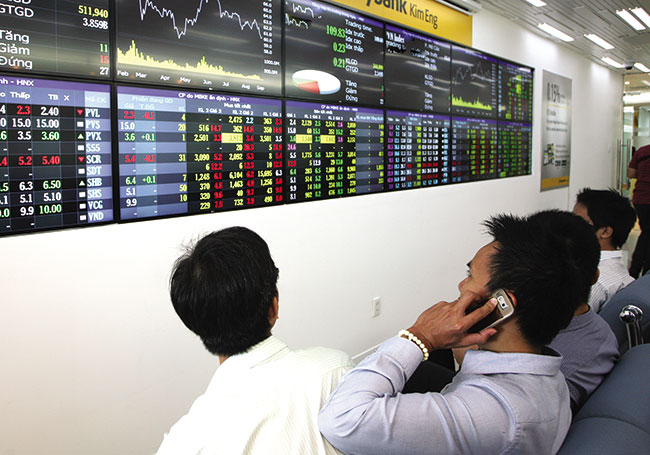Vietnam safe from China’s stock crash

Experts claim that China’s stock market crash will have little effect on Vietnam Photo: Le Toan
At the conference themed “China stock market crash and effects on Vietnam’s economy” held by VIR last week, experts agreed that the security market plunge of the world’s second largest economy was not likely to take a toll on Vietnam.
The crash began on June 12, 2015, with the popping of the stock market bubble. A third of the value A-shares on the Shanghai Stock Exchange was lost within one month.
By July 8-9, 2015, the Shanghai index had fallen 30 per cent over three weeks, and most recently, it fell again on July 27 by 8.5 per cent, despite efforts by the Chinese government. This marked the largest one-day fall since 2007.
Phan Trung Phuong, Chairman of F.I.T Investment JSC said that “like many other enterprises listed on Vietnam stock market, we are worried about the possible negative consequences of the Chinese plunge.”
However, Nguyen Son, head of the State Security Commission’s Securities Market Development Department said that the effect on Vietnam’s stock market would not be significant, due to the relatively small scale investment portfolio sourced from China.
For the bond market in particular, “currently the majority of active traders are commercial banks, holding some 83-86 per cent of the total amount released, who are not from China,” Son noted.
Regarding indirect effect, the Chinese stock market plunge is also unlikely to harm Vietnam’s traders in the short-term.
“Although China is currently Vietnam’s fourth largest importer, the effect would still be minor,” deputy director of the Central Institute for Economic Management Vo Tri Thanh said.
According to Thanh, this is due to capital mobilised through the Chinese stock market being equal to roughly a tenth of credit loans provided. Also, less than 15 per cent of Chinese household financial assets are invested in the stock market, explaining why a crashing price would do little to hurt consumption.
When it comes to the positive effect, experts have doubts about a substantial flow of capital redirected from China to Vietnam.
“There is under 1 per cent possibility that the capital withdraw out of China will pour into Vietnam,” said analysis director of the Saigon Securities Incorporated (SSI) Nguyen Duc Hung Linh.
Linh commented that the average price-earning ratio of Vietnamese tickers remained at a low of 12, in comparison with 20 in the Chinese market, and even less attractive compared to economies like Japan and India, where the flow was targeted.
Despite the insignificant effects, experts warned that due to similarities between two market models, Vietnam needed to develop a careful roadmap to stay far away from a falling market scenario.
“We should closely manage the finance market, especially focusing on risk prevention,” said Do Trong Khanh, head of the Ministry of Planning and Investment’s Finance and Monetary Department.
According to Son, like China, 80-90 per cent of stock investors in Vietnam were individuals, who followed the herd instinct with little professional analysis. This could lead to risky decisions. Also, the majority of capital was from state-owned companies, implying both markets largely depended on the government’s direction instead of market principles.
In another aspect, Son noted that China’s downturn was now believed to be precipitated by exploits of short selling transactions and index futures. “This is, unfortunately, what Vietnam is planning to boost in the time to come,” he said, adding that the authorised agencies would now be alerted and have to meticulously consider when and how to implement the tools, together with other new derivative products.
What the stars mean:
★ Poor ★ ★ Promising ★★★ Good ★★★★ Very good ★★★★★ Exceptional
Latest News
More News
- New rules ease foreign access to Vietnam equities (February 05, 2026 | 17:29)
- 0.1 per cent tax proposed on each transfer of digital assets (February 05, 2026 | 17:27)
- Ministry of Finance tightens policy delivery at start of year (February 05, 2026 | 17:26)
- Vietnam steps up market reforms as FTSE Russell reviews upgrade progress (February 05, 2026 | 17:20)
- 2025 profits mixed amid strong energy and farming results (February 05, 2026 | 17:18)
- Cashless payments hit 28 times GDP in 2025 (February 04, 2026 | 18:09)
- SSIAM and DBJ launch Japan Vietnam Capital Fund (February 04, 2026 | 15:57)
- Banks target stronger profits, credit growth in 2026 (February 04, 2026 | 15:43)
- Vietnam on path to investment-grade rating (February 03, 2026 | 13:07)
- Consumer finance sector posts sharp profit growth (February 03, 2026 | 13:05)















 Mobile Version
Mobile Version